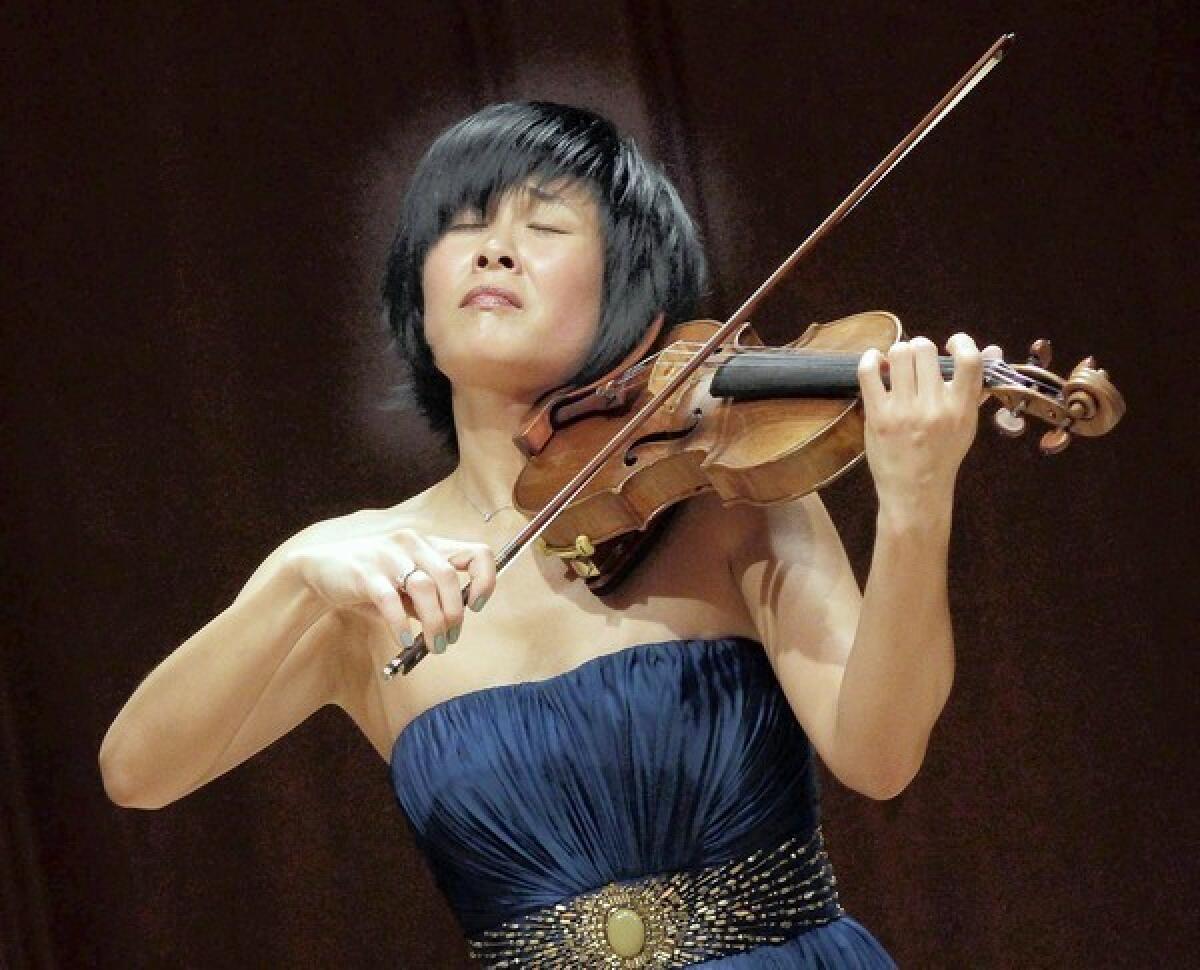Review: Jennifer Koh shows her own genius with Bach program

- Share via
With Montecito magically misted by a surprising spring drizzle Wednesday night, Jennifer Koh went, for a second time, beyond Bach. The violinist’s awe-inspiring solo recital at the Music Academy of the West’s Hahn Hall was the latest installment in her project of moderating a conversation between Bach’s solo violin sonatas and partitas with history as a way to bring music of the past into the present.
And this time Einstein may have had a little something to do with the violinist’s penetrating playing of Bach and Bartók in this beach town. The question is: How much has starring in a recent internationally admired revival of “Einstein on the Beach” changed Koh? In the limelight since wowing the 1994 International Tchaikovsky Competition in Moscow as a 17-year-old student at Oberlin, the Chicago-born violinist had all the ingredients for a conventionally brilliant career.
CHEAT SHEET: Spring Arts Preview
Her tone is big, bold and drop-dead gorgeous, just the thing for Romantic-era repertory. She hasn’t given up any of that. Less than three years ago, she appeared at the Cerritos Center with the Moscow State Symphony as soloist in the soupy Bruch Violin Concerto. A blindfolded listener could have been fooled into thinking that an American woman of Korean heritage in her early 30s was, in fact, a burly old-school Russian virtuoso in rumpled suit speckled with dandruff reaching into the throbbing depths of a passionate, vodka-besotted soul.
But music’s indeterminacy principle has found its way to her. She has followed her own quirky path, increasingly trying out new music. Some of it has been schlock (she recorded Menotti’s Violin Concerto), but she has a big spirit, and some of it has been important. She needed to figure out a few things, and she has. In 2006, she performed Lou Harrison’s Grand Duo for violin and piano as part of the Pacific Symphony’s festival of American composers.
Koh was the first major soloist to champion this major American sonata, but she left out the most important movement, and she burdened the score with too much vibrato. Two years later, though, she recorded the work, complete and with just the right amount of vibrato. She has, since then, been showing up at the Los Angeles Philharmonic with much that is new and impressive.
PHOTOS: Arts and culture in pictures by The Times
But the real leap has been her appearances in “Einstein on the Beach” (including the Los Angeles Opera presentation of the production in October). She brought both a musical presence to Philip Glass’ score and, thanks to Robert Wilson’s direction, a riveting stage presence as Einstein as well. She was simply more there there than I had ever witnessed in her performances.
Among her many recent projects has been her ongoing “Bach and Beyond” series, of which the admirable UC Santa Barbara’s Arts & Lectures is the only Southern California presenter. The first was two years ago. For Part II, Koh began with Bach’s First Sonata and Partita. She joined them with a short piece she commissioned from Phil Klein. After intermission she played Bartók’s 1944 Sonata for Solo Violin.
Koh’s Bach is unusual in that she does little to tone down her huge tone, which sounded magnificent in the intimate 400-seat auditorium. She approaches Bach with little attention to early music practices except in one crucial aspect, which is to hold back on the vibrato. The result was heightened intensity, Bach drunk straight. More than that, she offered an eager audience a Bach injection.
FULL COVERAGE: 2013 Spring arts preview
Kline’s 11-minute “Dead Reckoning” was the necessary relief between the sonata and partita. A composer who made his name in the early ‘90s with boom boxes, he is also the creator of “Unsilent Night,” new music’s hip Christmas caroling event. Here he took his inspiration from the singing of birds after 2011’s Hurricane Irene. Dead reckoning, it was, treading an even line, with agreeable chirping as an added attraction.
I’d be surprised if there were many species of birds, though, that could handle the explosive power that Koh brought to Bartók. Here Einstein made his presence most assuredly felt. As though she had found hidden forces of energy, Koh applied the pressure of bow on strings to produce sound waves of the sort that one imagines could cause climate change all by themselves.
Bartók’s sonata is like Bach amplified, and Koh took that one step further by playing as if Bartók amplified were amplified. When she dug in the second movement, a fugue, the small hall shrunk to nothing as the broken fugue subject and a listener’s pulse were one and the same. The slow movement was a halo of sound, impossible to place in space. Hello, Albert.
Koh returns to Hahn in two years for “Bach and Beyond Part III.” Between then she will not only have had more “Einstein on the Beach” under her belt, she will also have done a theatrical production of Bach’s Sonatas and Partitas with Wilson in Paris. Will this then be Einstein on the beach and way beyond?
MORE
INTERACTIVE: Christopher Hawthorne’s On the Boulevards
CHEAT SHEET: Spring Arts Preview
PHOTOS: Arts and culture in pictures
More to Read
The biggest entertainment stories
Get our big stories about Hollywood, film, television, music, arts, culture and more right in your inbox as soon as they publish.
You may occasionally receive promotional content from the Los Angeles Times.











